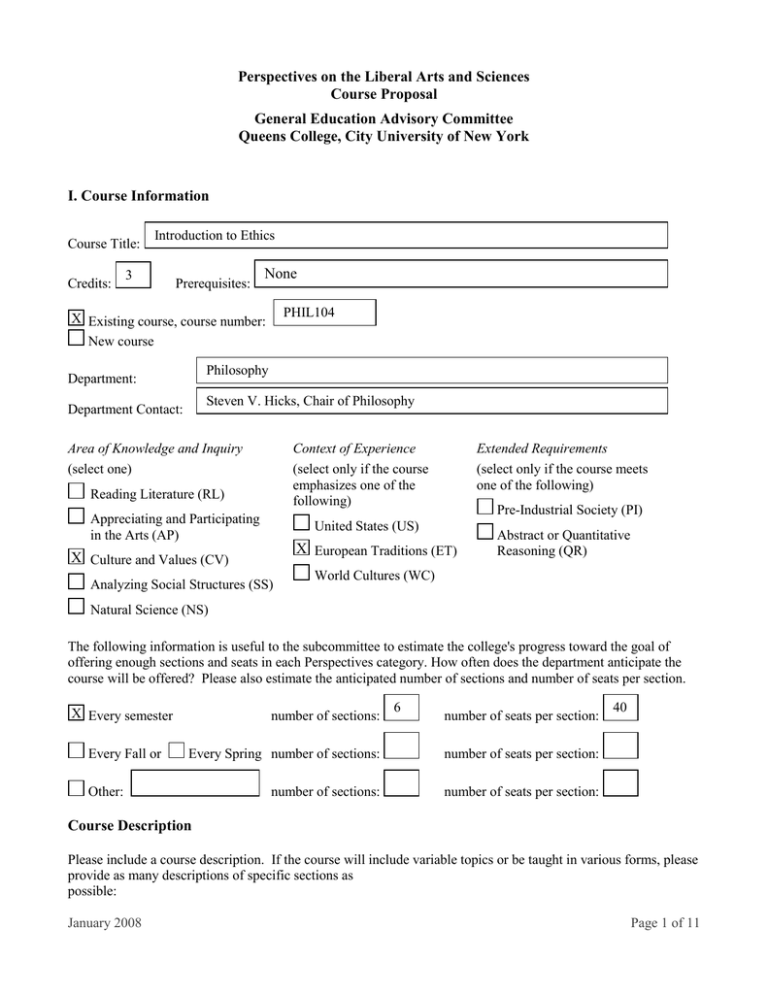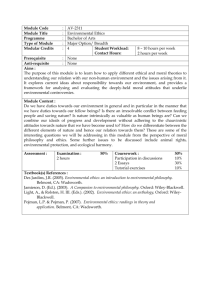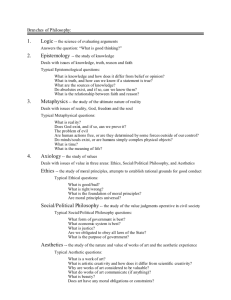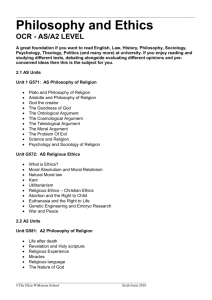Perspectives on the Liberal Arts and Sciences Course Proposal
advertisement

Perspectives on the Liberal Arts and Sciences Course Proposal General Education Advisory Committee Queens College, City University of New York I. Course Information Course Title: Credits: Introduction to Ethics 3 Prerequisites: None PHIL104 X Existing course, course number: New course Philosophy Department: Steven V. Hicks, Chair of Philosophy Department Contact: Area of Knowledge and Inquiry (select one) Context of Experience (select only if the course emphasizes one of the following) Reading Literature (RL) Appreciating and Participating in the Arts (AP) Extended Requirements (select only if the course meets one of the following) Pre-Industrial Society (PI) United States (US) X European Traditions (ET) X Culture and Values (CV) Analyzing Social Structures (SS) Abstract or Quantitative Reasoning (QR) World Cultures (WC) Natural Science (NS) The following information is useful to the subcommittee to estimate the college's progress toward the goal of offering enough sections and seats in each Perspectives category. How often does the department anticipate the course will be offered? Please also estimate the anticipated number of sections and number of seats per section. X Every semester Every Fall or number of sections: 6 number of seats per section: Every Spring number of sections: number of seats per section: number of sections: number of seats per section: Other: 40 Course Description Please include a course description. If the course will include variable topics or be taught in various forms, please provide as many descriptions of specific sections as possible: January 2008 Page 1 of 11 Philosophy 104, Introduction to Ethics, is described in Queens College’s Undergraduate Bulletin as follows: “An investigation of rival theories concerning moral goodness, rightness, happiness, freedom, and responsibility. Selected readings from classical and contemporary sources.” Accordingly, instructors in Philosophy 104 discuss with their students readings from notable philosophers, past and present, who represent the main alternative positions on the basic issues of ethics or moral philosophy as indicated in the Bulletin description. To spell out these issues in the form of questions, the following are the meat and potatoes of introductory ethics courses in philosophy departments everywhere, including Queens College: 1. How should we conduct ourselves if we are to live the best lives of which we are capable? Is knowledge obtainable about this, or only opinion—perhaps culturally variable opinion? 2. Do we have freedom of will with respect to how we conduct ourselves? 3. What makes for human happiness or well-being? Is the answer different for each person? 4. What determines the rightness or wrongness of our actions? The results they produce? The motivation behind them? The virtues or vices they indicate? Their intrinsic properties? 5. What things are good and desirable on their own account? Pleasure? Knowledge? Goodness of will? Love? The experience of beauty? 6. Do ethics and religion have implications for one another? Philosophers who have addressed these issues most creatively and influentially include Plato, Aristotle, Epicurus, Epictetus, Thomas Aquinas, Thomas Hobbes, Baruch Spinoza, Joseph Butler, David Hume, Immanuel Kant, Georg Wilhelm Friedrich Hegel, Jeremy Bentham, John Stuart Mill, Henry Sidgwick, Friedrich Nietzsche, George Edward Moore, William David Ross, JeanPaul Sartre, William Frankena, and John Rawls. Readings from any of these philosophers are suitable for introductory ethics courses, and selections from many of them are offered in anthologies published for such courses. Some instructors in Philosophy 104 use an anthology of this kind, and they are sure to assign readings in it that will introduce students to the two major schools of ethics—the teleological or consequentialist school of Mill and his predecessors and successors, and the deontological school of Kant and his predecessors and successors. (Plato, Aristotle, and some other classical philosophers, followed in recent times by the likes of Ross and Frankena, fall between the two schools, or have a foot in each. Roughly speaking, consequentialists answer “the results they produce” to question #4 above, whereas deontologists answer “their intrinsic properties.”) Attached is a syllabus for a section of Philosophy 104 in which such an anthology is assigned. Other instructors, however, prefer to assign as texts a few seminal classics that give a good idea of the diversity of perspectives in ethics, for example, Aristotle’s Nichomachean Ethics, Kant’s Foundations of the Metaphysics of Morals, Mill’s Utilitarianism, Nietzsche’s Genealogy of Morals, and Moore’s Principia Ethica. Such a selection of classics from the European Tradition, carefully studied, fills up a semester for Philosophy 104. Philosophy 104 aims to bring students to understand the ins and outs of the main rival theories of ethics, so that they can both (a) explain them accurately in their own words and (b) begin to evaluate their premises, inferences, conclusions, and wider implications, including their practical implications. We say “begin to” because some years of further experience are likely to be needed before students or former students are in a position finally to make up their minds as to which ethical theory does the fullest justice to the moral dimensions of life. Philosophy 104 aims to give students a good start. January 2008 Page 2 of 11 II. Criteria for Perspectives Courses Justification Please describe how the course will address criteria for Perspectives on the Liberal Arts and Sciences courses. Be sure to include an explanation of the course’s specific learning goals for students to make a connection between these and the general criteria for Perspectives courses. January 2008 Page 3 of 11 Can basic moral principles and values be defended by processes of reasoning or by citing data of any kind? If not, are they to be regarded as self-evident? Are the putative propositions conveying moral principles and judgments of value not really propositions at all, capable of truth or falsity, but instead injunctions, or expressions of emotion or attitude, or attempts to evoke emotion or attitude? These are very important questions of ethics, summed up in the question whether knowledge is obtainable in ethics, and introductory courses in the subject pay attention to different important answers to them. This involves students in active inquiry into the diversity and comparative differences of opinion between major philosophical thinkers in their search for global ethical meaning. It also profoundly reveals the existence and importance of changing ethical viewpoints over different historical periods. For this reason, much attention is given to a critical study of primary texts and source materials in the European ethical tradition. So Philosophy 104 certainly addresses how, if at all, knowledge is acquired in ethics, which brings the course into line with the first criterion given for PLAS courses. As for the second PLAS criterion, which is actually a question about the position of a discipline within the liberal arts and within society at large, it can safely be said that philosophy in general and ethics in particular are central to the liberal arts, if by “liberal arts” we mean, as Webster does, “the studies (as language, philosophy, history, literature, abstract science) in a college or university intended to provide chiefly general knowledge and to develop the general intellectual capacities (as reason and judgment) as opposed to professional or vocational skills” (see under "liberal arts" in Merriam-Webster's Collegiate Dictionary, 11th ed). Philosophy, from antiquity to the present day, has had as part of its mission the development of reason and judgment; indeed the methods of critical inquiry discovered and employed by philosophers from Socrates onward have been models in Western civilization and the European Tradition for intellectual cultivation. The methods developed by philosophers in the European Tradition for investigating questions of ethics, and also their formulations of the questions, are particularly calculated to foster development of intellectual capacities, for the questions and methods challenge one’s wits to an uncommon degree and are of no little personal interest, as ethics is about how one ought to live. As far as society in general is concerned, the position of ethics is the same as that of philosophy in general, and the position of philosophy in general is the same as that of the other liberal arts, which in society, first and foremost, stand for and endeavor to promote enlightenment and broadness of vision. These ends are desirable on their own account, and they are also desirable because, as Jefferson observed, how well a democratic form of government functions is dependent upon the extent to which voters and elected officials are intelligent and cultivated (see Jefferson's letter to John Adams, 28 October 1813). Philosophy 104 addresses matters in the “Culture and Values” area of PLAS courses. Ethics or moral philosophy is concerned precisely with “human values and ideals” in the moral sphere, with the logic of “moral deliberation,” with the issue of how to “defend moral choices in an informed and thoughtful way” (to quote from “Goals and Description of Requirements” for PLAS “Culture and Values” courses). If moral choices are to be thoughtfully defended, they must be shown to be compatible, at least, with defensible moral principles or values. Ethics investigates the nature and defensibility of (mostly long-recognized) alternative moral principles and values. Introductory courses in ethics aim to convey these to students and to encourage them to think carefully for themselves about which may be most acceptable. Philosophy 104 further conforms to the requirements by dealing exclusively with “original source materials,” namely, original writings of key figures in moral philosophy. January 2008 Page 4 of 11 Criteria Checklist Please be sure that your justification addresses all three criteria 1-3, below. For criteria 4-8, please check all that apply and discuss these in your justification. A Perspectives course must: 1. Be designed to introduce students to how a particular discipline creates knowledge and understanding. 2. Position the discipline(s) within the liberal arts and the larger society. 3. Address the goals defined for the particular Area(s) of Knowledge the course is designed to fulfill. In addition, a Perspectives course will, where appropriate to its discipline(s) and subject matter: X 4. Be global or comparative in approach. x X 5. Consider diversity and the nature and construction of forms of difference. X 6. Engage students in active inquiry. X 7. Reveal the existence and importance of change over time. X 8. Use primary documents and materials. X January 2008 Page 5 of 11 III. Course Materials, Assignments, and Activities Please provide an annotated list of course readings and descriptions of major assignments or exams for the course, as well as distinctive student activities that will engage students in working toward the course goals discussed in the course description and/or justification. Please include the author and title for each reading or text, along with a short description providing information about how the reading will contribute to course goals. See attached syllabus IV. Assessment Perspectives courses must be recertified every five years, and we are seeking ideas for how to best carry out this assessment. What forms of evidence that the course is meeting its goals as a Perspectives course would be appropriate to collect for this course during the next five years? How would you prefer assessment to be conducted? How might evidence of effective teaching and student learning be collected and evaluated? Questionnaires will be administered to graduating majors and minors in philosophy, asking whether they find introductory PLAS courses in philosophy valuable in retrospect, and why or why not. Questionnaires will also be emailed after five years to former students in general, asking whether they find introductory PLAS courses in philosophy valuable in retrospect, and why or why not. The Department of Philosophy continues to require a senior thesis for the major in philosophy. This provides excellent evidence of the long-term contributions of PLAS courses to the philosophy major’s education. Senior theses are collected by the Department’s undergraduate concentration advisor, who reviews them and discusses them with the Department’s Curriculum Committee, of which committee this advisor is a member. Grades in philosophy courses are determined on the basis of papers and essay exams by which instructors can gauge the progress of students when it comes to understanding things accurately, thinking critically, basing their convictions on evidence and rational argumentation, and grasping relevant alternative views. Another gauge of these matters is students’ performance in class discussion. Philosophy lends itself to dialogue, and the Department’s faculty, part-time as well as full-time, are adept at combining lecture with class discussion. January 2008 Page 6 of 11 V. Administration What process will your department develop to oversee this course, suggest and approve changes, and conduct assessment? Who will be in charge of this process? Also indicate whether the course will be primarily taught by full-time or adjunct faculty, or by a combination of the two types of instructor. PLAS philosophy courses will be taught by selected full-time faculty and adjunct faculty. The PLAS subcommittee of the Department’s Curriculum Committee will ensure that faculty in PLAS philosophy courses understand how their courses are to contribute to satisfying PLAS requirements and that syllabi will explain and comport with same. As a matter of fact, current syllabi for Philosophy 104, which the Curriculum Committee has examined, already comport with same. New instructors will be shown examples of syllabi for these courses and helped with the preparation of their own. Of course, teaching observations are conducted every semester for all untenured faculty and for adjuncts of fewer than ten consecutive semesters of employment in the Department. Consistency with PLAS goals will be monitored in these observations. VI. Syllabus Please attach a sample syllabus (or set of syllabi, for courses on variable topics or courses that will be taught in variable formats). Some resources to guide syllabus construction: The Provost's page outlining guidelines for syllabi: http://qcpages.qc.cuny.edu/provost/Cur_stud/Syllabus expectations.htm Sample syllabi for W courses, from Writing Across the Curriculum: http://qcpages.qc.cuny.edu/writing/wsyllabi.htm Goals for Student Writing at Queens College: http://qcpages.qc.cuny.edu/writing/Goals.htm Harvard’s Bok Center for Teaching and Learning, suggestions for syllabus planning: http://isites.harvard.edu/icb/icb.do?keyword=k1985&pageid=icb.page29695 Lehman College’s Gen Ed Syllabi Project: http://www.lehman.edu/lehman/programs/generaledu/gened_syllabi_project.html Submit this completed form and a sample syllabus (or set of syllabi) by email to Eva Fernández (eva.fernandez@qc.cuny.edu), Director, Center for Teaching and Learning. January 2008 Page 7 of 11 Sample Syllabus Philosophy104 Introduction to Ethics Prof. James N. Jordan Ethics, which is also called “moral philosophy,” is the field of philosophy that investigates issues such as the following: 1. How should we conduct ourselves if we are to live the best lives of which we are capable? Is knowledge obtainable about this, or only opinion—perhaps culturally variable opinion? 2. Do we have freedom of will with respect to how we conduct ourselves? 3. Should everyone always act in his or her self-interest? 4. What things are good and desirable on their own account? Pleasure? Happiness? Goodness of will? Justice? Love? Knowledge? The experience of beauty? 5. What determines the rightness or wrongness of our actions? The results they produce? The motivation behind them? Their intrinsic properties? 6. Do ethics and religion have implications for one another? This section of Philosophy 104 offers an introduction to ethics through, first, readings in a good anthology of writings by notable philosophers, past and present, who take different positions on the issues above and, second, a fine dialogue debating one of these issues (issue #2). The course aims to promote critical reflection on these issues and to encourage students to strive for their own reasoned positions on them. To these ends, one will be invited and assisted both (a) to achieve a good understanding of the arguments of the philosophers assigned, so that one can explain the philosophers’ assumptions, inferences, and conclusions accurately in one’s own words, and (b) to evaluate for oneself the truth of philosophers’ assumptions and the validity of their inferences, with a view to determining whether they have established their conclusions. The course fulfills Queens College’s general education requirement under the Culture and Values heading of Perspectives on the Liberal Arts and Sciences, for it examines contrasting views as to the attainability of knowledge in ethics; it aims, as representing a core liberal art (namely, philosophy), to develop general intellectual capacities such as reason and judgment, in the belief that both the individual and society are the better for such development; and it investigates major issues concerning moral values. TEXTS Louis P. Pojman, ed., Moral Philosophy: A Reader, 3rd ed. (Hackett) Clifford Williams, Free Will and Determinism: A Dialogue (Hackett) READING ASSIGNMENTS [Specific dates and page assignments for each class meeting to be supplied in syllabus given to students.] Weeks 1 and 2: What Is Morally Right Conduct? (Pojman, Part I) Opening dialogue in Plato’s Republic. Moral Relativism vs. Moral Objectivism (Pojman, Part II) Herodotus: Custom Is King (from Herodotus’s Histories) Thomas Aquinas: Natural Law (from Summa Theologica) Ruth Benedict: A Defense of Ethical Relativism (from “Anthropology and the Abnormal”) Louis P. Pojman: A Defense of Ethical Objectivism (new essay in Pojman) January 2008 Page 8 of 11 Week 3: Do we have free will? Williams, Free Will and Determinism Weeks 4 and 5: Ethics and Egoism (Pojman, Part III) Plato: Why Should I Be Moral? (from Republic) Thomas Hobbes: Egoism as the Beginning of Morality (from Leviathan) Ayn Rand: A Defense of Ethical Egoism (from Atlas Shrugged) James Rachels: A Critique of Ethical Egoism (from Elements of Moral Philosophy) Howard Kahane: Sociobiology, Egoism, and Reciprocity (new essay in Pojman) Weeks 6 and 7: Value: What Is the Good? (Pojman, Part IV) Plato: The Good and the Allegory of the Cave (from Republic) Jeremy Bentham: Classical Hedonism (from Principles of Morals and Legislation) Friedrich Nietzsche: Beyond Good and Evil (from Beyond Good and Evil, The Genealogy of Morals, and The Twilight of the Idols) Robert Nozick: The Experience Machine (from Anarchy, State, and Utopia) W. D. Ross: Value Pluralism (from The Right and the Good) Weeks 8, 9, and 10: Utilitarianism: An Ethics of Consequences (Pojman, Part V) John Stuart Mill: Utilitarianism John Hospers: Rule-Utilitarianism (from Human Conduct) Bernard Williams: A Critique of Utilitarianism (from Utilitarianism: For and Against) Sterling Harwood: Eleven Objections to Utilitarianism (new essay in Pojman) Weeks 11, 12, and 13: Deontological Ethics: The Ethics of Good Will and Duty (Pojman, Part VI) Immanuel Kant: The Foundations of Ethics (from Grounding for the Metaphysics of Morals) Fred Feldman: An Examination of Kantian Ethics (from Introductory Ethics) W. D. Ross: What Makes Right Acts Right? (from The Right and the Good) William Fankena: A Reconciliation of Ethical Theories (from Ethics, 2nd ed.) Week 14: Morality and Religion (Pojman, Part VIII) Plato: The Euthyphro Problem (from Euthyphro) Bertrand Russell: A Free Man’s Worship (from Mysticism and Logic) George Mavrodes: Religion and the Queerness of Morality (a journal article) Kai Nielsen: Ethics Without Religion (a journal article) WRITING ASSIGNMENTS The graded written work for this course is as follows: (1) A paper of at least three pages in which you compare and contrast the views on moral relativism given in the readings from Benedict and Pojman (pp. 33-52 in Pojman). Due at the seventh class meeting [precise date to be supplied]. January 2008 Page 9 of 11 (2) A take-home midterm exam (of the “essay” type) on Williams’s Free Will and Determinism and on the readings in Pojman’s Parts III and IV (pp. 53-130: Ethics and Egoism; Value: What Is the Good?). At least six pages are required. Due at the fourteenth class meeting [precise date to be supplied]. Questions for the midterm will be provided two weeks before the due date. (3) An in-class comprehensive final exam (of the “essay” type), in the fifteenth week of the semester [precise date to be supplied]. Six or seven questions for the final exam will be provided two weeks before the exam. At the time of the exam your instructor will announce which three of these questions are to be answered. Assignment #1 is designed to give beginners practice in accurately explaining, relating to one another, and evaluating the comparative merits of two different philosophical positions on the same topic in ethics. Assignments #2 and #3 will involve more comparing, contrasting, and assessing of more philosophical views on more topics in ethics. Accuracy of understanding and development of critical analysis will determine grades--“critical analysis” meaning in this context discussion of (a) the truth of philosophers’ premises and (b) the validity of their reasoning, and (c) the truth of their conclusions. Students should think for themselves about (a), (b), and (c). To this end, your instructor will keep his own views to himself, aiming only to explain the readings as clearly as possible and to promote and guide discussion of them. Carefully follow the attached Guidelines for Papers. SEMESTER GRADE Improvement and participation in class discussion will be taken into consideration, but the general rule is that assignment #1 above will account for 15% of your semester grade, #2 for 40%, and #3 for 45%. ATTENDANCE Regular and on-time attendance is expected, as lectures and class discussions will be essential to good performance on papers and exams. OFFICE HOURS Office: Powdermaker Hall 350-E. Telephone: (718) 997-5280. Email address: James.Jordan@QC.cuny.edu. I will be in the office on Mondays from 1:00 to 3:00 and 5:30 to 6:15, on Wednesdays from 1:00 to 3:00, and on Thursdays from 1:00 to 5:00 and 6:00 to 6:45. Other times can be arranged. Feel perfectly free to stop by the office, or to call or email me, about anything you would like to discuss concerning the reading and writing assignments, or philosophy generally. Guidelines for Papers James N. Jordan, Philosophy Dept. 1. Papers should by typed or word-processed on one side of the page. The type should be dark. For word processing use 12 point type. 2. Papers should be double-spaced. Do not leave extra spaces between paragraphs. (One extra space may be used to indicate a new section of the paper.) Indent the first line of each paragraph five or six spaces. 3. Leave margins of an inch or so all around. Pages should be numbered (at the top). 4. Do not put the paper into any kind of folder or binder. Just staple or clip it together in the upper left-hand corner. Do not put a row of staples down the left-hand margin. January 2008 Page 10 of 11 5. Aim for the greatest possible clarity. Write as if you are addressing, not your instructor, but someone who knows nothing about the subject matter in question. Use standard English; avoid jargon, pompous words, and awkward constructions. Define key terms. Do not jump from one thing to another in a disconnected manner. Each sentence should have an obvious relevance to the sentences before and after it. The same goes for paragraphs. Explain, analyze, and discuss things in a way that is logically organized, fully developed, accurately informed, and intelligible on its own. 6. Make every effort to spot and correct errors of spelling, punctuation, and grammar. Use a manual of punctuation and grammar, such as Diana Hacker’s Writer’s Reference (Bedford-St. Martin’s). 7. Documentation and quotation marks (or setting off by indentation) are mandatory for all phrases, sentences, and passages borrowed from others. For documentation, use the simple MLA method of parenthetical citations, which is explained in Hacker (see #6 above) and also in J. Gibaldi, MLA Handbook for Writers of Research Papers (Modern Language Association). 8. Keep quotations down to 10% of less of the total words in your paper. 9. Underline (or italicize) titles of books. Example: Plato’s Republic (or Republic). Exceptions to this rule are titles of books of sacred scripture, which by custom are done simply as follows: Bible, the Book of Genesis, Koran, Bhagavad-Gita. 10. In American usage, commas and periods go inside quotation marks, except when parenthetical citations are involved. Examples: “Triangle,” according to Webster, means “a polygon having three sides.” “Brevity,” Shakespeare said, “is the soul of wit” (Hamlet II, ii, 90). REMEMBER: The possessive of it is its, NOT it’s (which means “it is”). Their is the possessive of they; don’t confuse it with there. January 2008 Page 11 of 11






